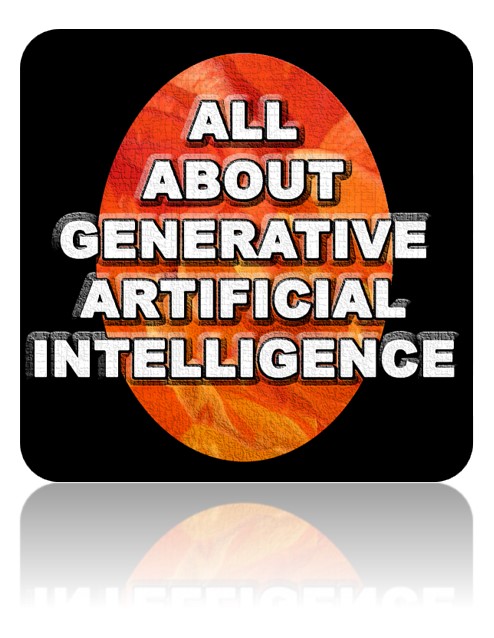Introduction To Generative AI
Articles Series: All About Generative Artificial Intelligence
Conversation With Chat GPT4 18 January 2024

F McCullough Copyright 2023 ©
Article Overview
Generative AI, using neural networks and deep learning,
creates new content across various domains, presenting opportunities and
challenges in authenticity, ethics, and intellectual property.
Introduction To Generative AI
Generative AI refers to a type of artificial intelligence
that is designed to create content. It's a rapidly evolving field that
encompasses the creation of images, music, text, and even video. The essence of
generative AI lies in its ability to learn from existing data and generate new,
original content that is often indistinguishable from human-generated content.
Key Components Of Generative AI
Machine Learning & Deep Learning
Generative AI relies heavily on machine learning,
particularly a subset called deep learning. Deep learning uses neural networks
with many layers (hence 'deep') to process data and make decisions.
Neural Networks
Neural Networks are algorithms modelled after the human
brain. In generative AI, they learn to recognise patterns and features in large
datasets, which they use to generate new content.
Generative Adversarial Networks (GANs)
GANs are a revolutionary approach in generative AI. They
consist of two neural networks, the generator and the discriminator, which work
against each other. The generator creates content, while the discriminator
evaluates it. Through this process, the quality of the generated content
continually improves.
Applications Of Generative AI
Image & Video Generation
Generative AI can create realistic images and videos from
scratch or modify existing ones. This has applications in entertainment, art,
and even virtual reality.
Music Composition
AI can now compose music in various genres, either creating
new pieces or emulating the style of existing composers and artists.
Text Generation
AI models like GPT (Generative Pretrained Transformer) can
write coherent and contextually relevant text, useful in areas like content
creation, chatbots, and creative writing.
Drug Discovery
In healthcare, generative AI can help design new molecules
for drugs, speeding up the discovery process and reducing the reliance on trial
and error.
Challenges & Ethical Considerations
Authenticity & Ethics
There's a fine line between creative use and misuse.
Generative AI can create deepfakes or plagiarised content, raising concerns
about authenticity and ethical use.
Bias
If the training data is biased, the AI-generated content can
also be biased. This requires careful curation and oversight of training
datasets.
Job Displacement
As AI becomes more capable of performing creative tasks,
there's a concern about the displacement of jobs in areas traditionally
dominated by humans, such as writing, art, and music composition.
Intellectual Property
Generative AI challenges traditional notions of intellectual
property, as it becomes difficult to attribute AI-generated content to a single
creator or owner.
Concluding Overview
Generative AI is an exciting field that blurs the lines
between human and machine creativity. It has the potential to revolutionise
various industries, from entertainment to healthcare. However, it's imperative
to navigate the ethical and practical challenges it presents, ensuring
responsible and beneficial use.
Key Takeaways
Generative AI, uses neural networks and deep learning that
creates new content across various domains, presenting opportunities and
challenges in authenticity, ethics, and intellectual property.
Conversation with Open AIís ChatGPT4 Reviewed, Revised and Edited by F McCullough, Copyright 2023 ©
Series: All About Generative Artificial Intelligence
Other articles in the series may be found here.
Links
Agriculture
Articles
Artificial Intelligence
Business
Ecology
Education
Finance
Genomics
Goats
Health
History
Leadership
Marketing
Medicine
Museums
Photographs & Art Works
Artworks, Design & Photographs Index
Other Photographs & Art Works By F McCullough
Places To Visit
Other Museums And Places To Visit
Plants
Poetry
Research
Science & Space
Science & Space Articles & Conversations
Short Stories
Songs
Technology
Thought Of The Day
The future of AI is not just about machines learning,
but humans learning to work with machines.
Information
Image Citations
- † All About Generative Artificial Intelligence F McCullough Copyright 2023 ©
Table Of Contents
Articles
Series: All About Generative Artificial Intelligence
Key
Components Of Generative AI
Machine
Learning & Deep Learning
Generative
Adversarial Networks (GANs)
Challenges
& Ethical Considerations
Series: All
About Generative Artificial Intelligence
Copyright
Keywords: AI adoption, AI applications,
AI challenges, AI ethics, AI implementation, AI innovation, AI integration, AI
models, AI readiness, AI security, AI talent development, AI technology, AI
training programs, Artificial Intelligence, Autonomous AI, Business AI
strategy, C-suite AI strategy, Collaborative AI, Corporate AI, Data governance,
Data privacy, Data processing, Ethical AI, General AI, Machine Learning,
Predictive AI, Quantum computing, Real-time AI, Responsible AI, Technological
advancement
Hashtags: #AI_adoption,
#AI_applications, #AI_challenges, #AI_ethics, #AI_implementation,
#AI_innovation, #AI_integration, #AI_models, #AI_readiness, #AI_security,
#AI_talent_development, #AI_technology, #AI_training_programs,
#Artificial_Intelligence, #Autonomous_AI, #Business_AI_strategy,
#C-suite_AI_strategy, #Collaborative_AI, #Corporate_AI, #Data_governance,
#Data_privacy, #Data_processing, #Ethical_AI, #General_AI, #Machine_Learning,
#Predictive_AI, #Quantum_computing, #Real-time_AI, #Responsible_AI, #Technological_advancement
Created: 18 January 2024
Published: 19 January 2024
Page URL: https://www.mylapshop.com/introductiontogenerativeai.htm
